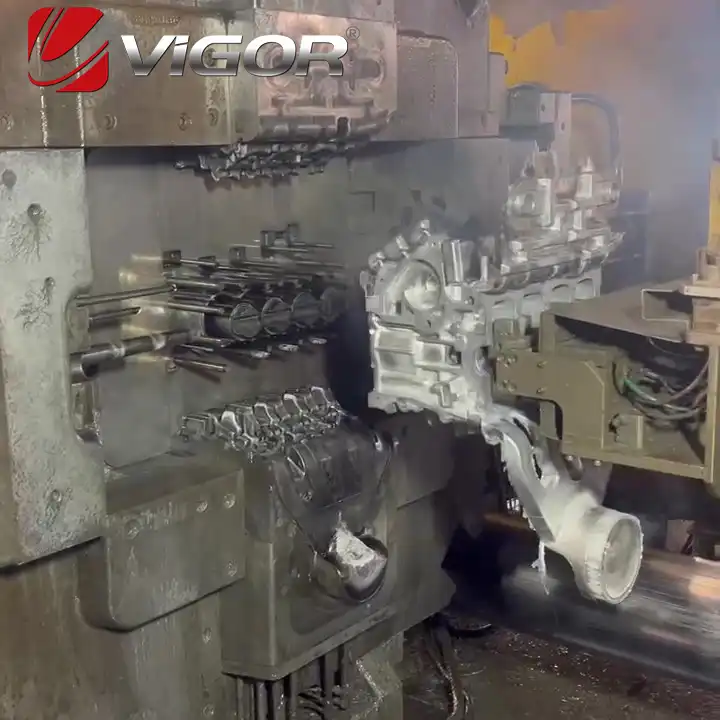
Knowledge
How Are the Dies Prepared With High-Pressure Die Casting?
Initially, the die is designed and manufactured from high-grade steel to accommodate the part's specifications, including: the flow, solidification, and cooling of the molten metal. Once assembled, the die, comprising two halves — the stationary cover die and the movable ejector die — undergoes the application of a release agent to prevent molten metal adhesion and facilitate easy part removal. Preheating the die to a specific temperature before casting is crucial for minimizing thermal shock and enhancing metal flow. The die is then installed into the casting machine, in which it is aligned and clamped under force. Lubrication and cooling systems are integrated within the die to ensure smooth operation and temperature control during the casting process.
What Materials Are Used in the Process of High-Pressure Die Casting?
In the high-pressure die casting process, non-ferrous metals are predominantly used due to their excellent casting properties. The most commonly used materials in HPDC include:
l Aluminum Alloys: Aluminum is a popular pressure die casting alloy due to its inherent properties such as: being lightweight, offering dimensional stability, resisting corrosion, providing electrical conductivity, and withstanding high temperatures. Aluminum alloys are widely used in automotive, aerospace, and consumer electronics for parts like: engine components, frames, and housings. It exhibits excellent flow characteristics under high pressure when melted, yet necessitates a cold chamber system to yield high-quality castings. Commonly used aluminum alloy grades include: 380, 390, 412, 443, and 518.
l Zinc Alloys: Zinc alloys offer high strength, good ductility, and a lower melting point compared to aluminum. It is suitable for intricate shapes and thin walls in applications like: automotive components, complex gears, and decorative items. This material is compatible with both hot and cold chamber die casting systems. Widely used zinc alloys in high-pressure die casting processes are: Zamak 2, Zamak 3, and Zamak 5.
l Magnesium Alloys: Magnesium is the lightest structural metal, providing parts with the lowest weight. Magnesium also has high machinability and, due to its lower melting point, is suitable for hot chamber die casting. It is used in applications requiring high strength-to-weight ratios, such as automotive and aerospace components. Common alloys used include: AE42, AM60, AS41B, and AZ91D.
l Copper Alloys: Due to its tendency to crack, shrink, and develop porosity, pure copper is rarely used in die casting. Copper-based alloys such as: brass, bronze, and beryllium copper are more commonly employed in the die casting processes. These alloys are used for their excellent electrical conductivity, heat resistance, and corrosion resistance, suitable for electrical components, heat sinks, and other applications in which these properties are desired.
What Are the Types of Pressure Die Casting?
There are two types of pressure die casting: low-pressure die casting (LPDC) and high-pressure die casting (HPDC). Low-pressure die casting works with lower pressures, as the name suggests, and also functions with much lower speeds, whereas high-pressure die casting operates at significant speeds and pressures. Besides these classifications, pressure die casting, or die casting in general, can also be classified based on the chamber types:
l Hot Chamber: In hot chamber die casting the metal is heated inside the casting machine. It works best with lower-melting-point metals like: tin, magnesium, and lead alloys.
l Cold Chamber: Here, the metal is heated in a separate furnace and then transferred into the casting machine. This is ideal for metals with high melting points like: brass, copper, and aluminum.
Vigor's mechanical casting department has rich casting experience and can provide you with a wide variety of casting processes. Our technical engineers will be involved in the whole process of product production, testing and delivery of integrated services to ensure that customers can receive the best quality products. If you are interested in Vigor's foundry products, please do not hesitate to get in touch with us for the best quality technical and product support.




